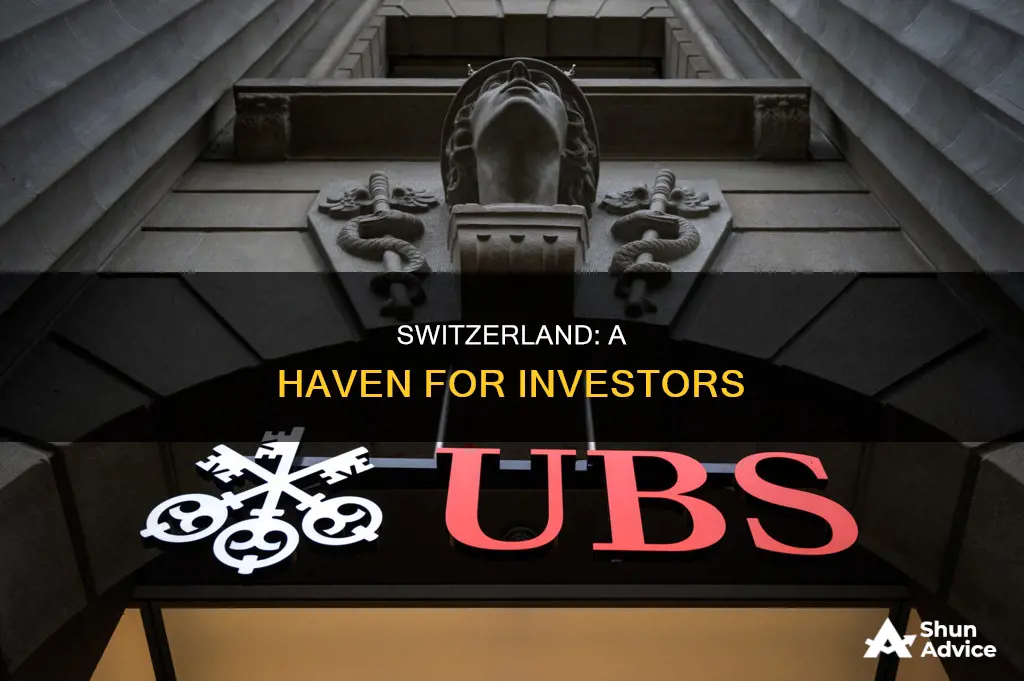
Switzerland is an attractive country for investors due to its stable economy, strong business culture, and low national debt. The country has a competitive business environment, a highly skilled workforce, and a favourable tax system. It is also known for its economic and political stability, strong currency, and advanced technological and research capabilities. Switzerland's strategic location in Central Europe provides easy access to other European markets, further enhancing its appeal for investors.
What You'll Learn
- Switzerland's stable economy, low national debt, and strong business culture
- The country's skilled workforce and high literacy rate
- The Swiss franc's strength and stability
- Switzerland's geographic location and accessibility to other European countries
- The country's political neutrality and favourable tax system

Switzerland's stable economy, low national debt, and strong business culture
Switzerland's economic stability is one of the country's most well-known attributes. The country has one of the world's most advanced economies, ranking as the third-richest landlocked country globally. Switzerland's per capita GDP is among the highest in the world, with a 2022 figure of USD 92,000. The country's strong economic performance is largely driven by its services sector, which generates approximately 74% of Swiss GDP.
Switzerland's economic stability is also underpinned by its low national debt. At the start of 2021, gross government debt stood at approximately CHF 100 billion, representing 15% of GDP. This is considered a low level of public debt relative to other countries, even during the COVID-19 crisis.
Switzerland's strong business culture is another key factor in its economic success. The country is a global financial hub, with a highly skilled workforce and a business-friendly environment. The country's neutrality and stable political environment also make it an attractive destination for investors. The country's taxation system, geographic position, and low inflation rate further enhance its appeal for businesses.
Switzerland's strong business culture is reflected in its focus on innovation and start-ups. The country is known for its high-technology, knowledge-based production, and its extensive industrial sector. The country's businesses are largely small and medium-sized enterprises (SMEs), with over 99% employing fewer than 250 staff. Switzerland also has a highly efficient social security system, with social expenditure standing at roughly 24.1% of GDP.
Goldman Sachs: Applications Flood In
You may want to see also

The country's skilled workforce and high literacy rate
Switzerland has the most highly skilled workers in the world. In the World Economic Forum's Global Competitiveness Report, Switzerland comes in fifth overall but ranks first for skills. The country was ranked the best in the world for vocational training, on-the-job training, and the employability of its graduates.
Switzerland's high literacy rate of 99% makes it the sixth most literate country in the world. This, coupled with its high level of education, makes it a desirable country for foreign companies to invest in.
Switzerland's focus on education is key to its prosperity and innovative strength. The Swiss education system faces challenges due to global economic and ecological changes and the rapid development of information technology. However, the country is taking steps to adapt to these changes and ensure the employability of its population.
Up to 70% of secondary school students take part in Switzerland's vocational education training system (VET), according to a 2015 report by the Center for International Education Benchmarking (CIEB). From the age of 16, most young people in Switzerland stop full-time education and instead rotate between school, inter-company courses, and hands-on work experience. This approach provides them with a wage and introduces them to the world of work.
The VET system, in which 30% of Swiss companies participate, prepares students for careers in various occupations and sectors. It enjoys strong support from Swiss employers, who credit it with contributing to the country's economic vitality and strength.
Switzerland's emphasis on vocational training means that less importance is placed on obtaining a university degree. Less than a third of young people under 25 pursued tertiary education in 2012, compared to more than half in countries like Australia and Norway. Many apprentices who have undergone vocational training end up with better job prospects than graduates, including the chief executive of Swiss bank UBS, Sergio Ermotti, who started his career as an apprentice at a local bank.
Salary and Investment: A Correlation
You may want to see also

The Swiss franc's strength and stability
The Swiss franc is the strongest currency in the world and is considered a safe investment for several reasons. Firstly, its long-term value is tied to the strength and stability of the Swiss economy, which has a long history of low debt and fiscal responsibility. Switzerland's lack of participation in the European Union also means it is not impacted by the euro debt crisis.
Secondly, Switzerland has a long history of hard assets, including gold reserves, which investors know the Swiss franc is tied to. The country's small debt market also contributes to its economic benefit. If a large economy, such as Russia or Germany, invested its vast reserves in Swiss debt, it could essentially seize control of that debt. However, this is difficult due to the tiny market size and Switzerland's lack of a necessity for foreign money due to its lack of a deficit. This protects the Swiss economy and helps keep the Swiss franc steady in value.
Thirdly, the Swiss franc has a strong GDP, a lack of a budget deficit, low unemployment, a sizeable economic contribution from the financial services sector, high per capita income, and a status as a destination for cash through hidden bank accounts.
Finally, the Swiss franc is under the sole control of the Swiss National Bank (SNB), which has the power to open the floodgates for money production and close them when needed. The SNB's consistent monetary policy has helped the franc gain value over time.
Investments: The Drive to Gain More
You may want to see also

Switzerland's geographic location and accessibility to other European countries
Switzerland's well-developed infrastructure further enhances its accessibility. The country has a strong road network, with car access to over 30 European countries. Additionally, its membership in the Schengen Area since 2008 simplifies travel and trade within Europe. Switzerland's location and infrastructure make it an ideal hub for multinational companies, with approximately 30% of the world's biggest brands having offices in the country.
The country's geographic position also offers strategic advantages for businesses. Switzerland is not a member of the European Union but is part of the European Free Trade Association. This allows companies to access the European market without being subject to specific EU regulations. Additionally, Switzerland has signed Double Taxation Agreements with 55 countries to prevent double taxation for investors.
Switzerland's landscape is characterised by its mountains, including the famous Alps, and numerous lakes. The Alps cover about 60% of the country's land area, and the Jura Mountains are located to the north. The Swiss Plateau, which runs along the east-west axis of the country, is where most of the population resides. Major cities such as Geneva, Zurich, Basel, Lucerne, and Bern are located on this plateau, contributing significantly to the country's economic activity.
Switzerland's geographic features also contribute to its economic stability and attractiveness for investors. The country has abundant freshwater reserves, accounting for 6% of Europe's total. It is the source of significant European rivers, including the Rhine, Rhone, Inn, and Ticino, which flow into different seas, facilitating trade and transportation. Additionally, the mountainous regions provide tourism opportunities, with the Alps being one of the most recognisable symbols of Switzerland.
Why Invest in Farms?
You may want to see also

The country's political neutrality and favourable tax system
Switzerland's political neutrality and favourable tax system are key factors in its status as a top investment destination. The country's neutrality is a core principle of its foreign policy, ensuring non-involvement in armed conflicts and promoting peace. This stance, coupled with its stable political environment, makes Switzerland an attractive safe haven for investors seeking to protect their assets.
Switzerland's tax system is highly favourable to investors, with its low taxation rates for both individuals and corporations. The country's tax structure comprises national, cantonal, and communal taxes, with cantons and communities levying the highest tax portions. The current direct federal tax rate is 8.5%, while cantonal profit tax rates vary from 5.9% to 16%, and cantonal capital tax rates range from 0.05% to 0.3%. The total taxation rate in Switzerland falls between 14.5% and 25%.
Additionally, Switzerland offers tax breaks and incentives to further enhance its appeal to investors. The country has signed Double Taxation Agreements with 55 countries to prevent double taxation on the same item. Moreover, Switzerland's tax laws provide cantons with sovereignty over federal tax rates, allowing each canton to offer its own tax breaks for investment projects. As a result, some cantons, like Zug, Schwyz, Slon, and Stans, offer tax rates as low as 1.78%.
Switzerland's favourable tax system also extends to private pensions, which are tax-free, and property transactions, which have some of the lowest costs in Europe. The country's tax policies, combined with its political neutrality, contribute to its reputation as a preferred investment hub.
Saudi Women's Rights: Investors' Dilemma
You may want to see also
Frequently asked questions
Switzerland has a stable economy, a strong business culture, and is considered one of the main financial hubs in the world.
Some of the best types of investments in Switzerland include investment funds, stocks, bonds, ETFs, and real estate.
Some benefits of investing in Switzerland include economic stability, a competitive business environment, a strong currency, and a high quality of life.
Yes, there are some risks to consider when investing in Switzerland, such as high property prices, strict regulations for foreigners, and potential hidden fees.
Some attractive sectors for investment in Switzerland include banking, insurance, manufacturing, IT, research and development, and tourism.







